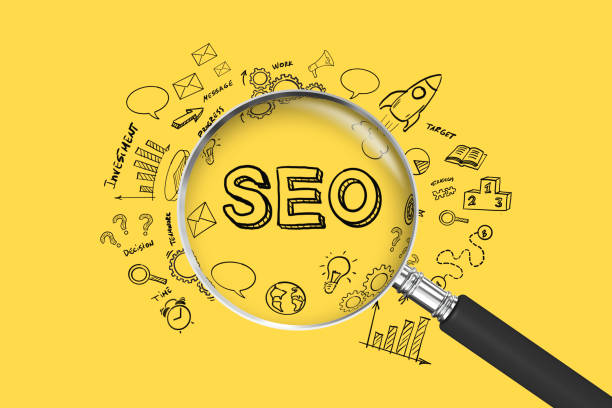What is SEO and Why Does It Matter?

What is SEO and Why Does It Matter?
#SEO, or Search Engine Optimization, is a collection of techniques and strategies used to improve a website’s ranking in search engine results like Google, Bing, and Yahoo.
The main goal of SEO is to increase website visibility and attract more organic (non-paid) traffic.
In today’s digital world, SEO plays a vital role in the success of businesses.
This is because most internet users use search engines to find the information, products, or services they need.
If your website does not appear on the first pages of search results, you will likely lose a large portion of your potential customers.
The importance of SEO lies in a few key reasons:
1.
Increasing Organic Traffic Organic traffic is traffic that is directed to your website without paying for advertising.
This type of traffic is usually of higher quality, because users who arrive at your website through search are looking for information or products related to your website’s content.
2.
Improving Credibility and Trust When your website ranks high in search results, users subconsciously trust the credibility and reliability of your website more.
This can lead to an increase in conversion rates (converting visitors into customers).
3.
Competitiveness If your competitors are investing in SEO and optimizing their website for search engines, you need to do it too to avoid falling behind them.
SEO helps you maintain your position in the competitive online market and even surpass your competitors.
4.
High Return on Investment (ROI) SEO is a long-term investment that can have a very high return on investment.
Although it may require time and money initially, it can drive steady and high-quality traffic to your website in the long run.
Are visitors to your online store leaving before making a purchase? Don’t worry anymore! With Rasaweb’s professional online store design services, solve the problem of not converting visitors into customers forever!
✅ Significant increase in conversion rates and sales
✅ Unique and attractive user experience
⚡ Contact us now for a free consultation!
Basic SEO Principles 2024

Basic SEO Principles 2024
SEO is a complex and multifaceted process that involves a variety of factors.
However, there are some basic SEO principles that are essential for every website:
1.
Keyword Research First of all, you need to identify keywords related to your business.
Keywords are the phrases that users enter into search engines to find the information, products, or services they are looking for.
To find the right keywords, you can use tools such as Ahrefs, Google Keyword Planner, and SEMrush.
2.
Content Optimization The content of your website should be relevant to your target keywords and answer users’ questions and needs.
High-quality, original, and engaging content is one of the most important ranking factors in search engines.
Avoid using Keyword stuffing.
3.
Website Structure Optimization Your website structure should be logical and organized so that users and search engines can easily navigate it.
Use short and descriptive URLs and structure your website using appropriate HTML tags (such as title, paragraph, and heading tags).
4.
Website Speed Optimization The loading speed of your website is an important factor in user experience and search engine ranking.
Try to improve your website speed using techniques such as image compression, code optimization, and using Content Delivery Networks (CDNs).
5.
Link Building Link building is the process of creating links from other websites to your website.
Links act as a vote of confidence for your website and can help improve your website’s ranking in search engines.
Try to get high-quality links from reputable and relevant websites in your field.
How does On-Page SEO work?

How does On-Page SEO work?
On-page SEO refers to the set of actions you take within your website to improve your website’s ranking in search engines.
These actions include optimizing content, website structure, HTML tags, and other factors related to the website itself.
Title Tag Optimization The title tag is the title that appears in search results and browser tabs.
The title tag should be relevant to your target keywords and be attractive and compelling to encourage users to click on your website link.
Meta Description Optimization The meta description is a summary of the page’s content that appears in search results below the title tag.
The meta description should be attractive and descriptive to encourage users to click on your website link.
Heading Optimization Headings (H1 to H6 tags) are used to structure the page content.
Headings should be relevant to your target keywords and help users easily understand the page content.
Image Optimization Images can help make the page content more attractive and easier to understand.
However, images should be optimized so that they do not slow down the page loading speed.
Use descriptive file names and Alt tags for images.
Internal Linking Optimization Internal links are links that point from one page of a website to another page on the same website.
Internal links can help improve website structure, guide users and search engines, and improve website ranking.
Here is a table summarizing the key points of on-page SEO:
| Factor | Importance | Description |
|---|---|---|
| Title Tag | High | Includes keywords, attractive and persuasive |
| Meta Description | Medium | An attractive summary of the page’s content |
| Headings | High | Content structuring, includes keywords |
| Images | Medium | Size optimization, descriptive file name, Alt tag |
| Internal Links | High | Improving website structure, guiding users |
Off-Page SEO and the Importance of Link Building

Off-Page SEO and the Importance of Link Building
Off-page SEO refers to the set of actions you take outside of your website to improve your website’s ranking in search engines.
These actions include link building, social media marketing, branding, and other activities that help increase your website’s credibility and visibility.
Link building is the most important part of off-page SEO.
Links act as a vote of confidence for your website and can help improve your website’s ranking in search engines.
The more high-quality and relevant links that point to your website, the higher your website’s ranking in search engines will be.
There are several ways to build links, including:
1.
Creating High-Quality Content High-quality and valuable content naturally attracts more links.
If your content is useful, engaging, and unique, other websites will link to it.
2.
Guest Blogging Guest blogging is the process of writing articles for other websites in exchange for a link to your website.
Guest blogging can help you get high-quality links from reputable and relevant websites in your field.
3.
Participating in Forums and Social Networks Participating in forums and social networks related to your field can help you connect with other professionals and enthusiasts and get links to your website.
4.
Creating Profiles on Directory Websites Creating profiles on reputable directory websites can help you get links to your website and increase your website’s visibility.
Does your company’s website create a professional and lasting first impression on potential customers? Rasaweb, with its professional company website design, not only represents your brand’s credibility but also opens a path for your business growth.
✅ Creating a powerful and trusted brand image
✅ Attracting target customers and increasing sales
⚡ Get a free consultation
Useful Tools for SEO

Useful Tools for SEO
SEO tools can help you make the SEO process easier and more efficient.
There are different SEO tools available, each with its own features and capabilities.
Some useful tools for SEO include:
1.
Google Analytics Google Analytics is a free tool that helps you analyze your website traffic.
Using Google Analytics, you can get information such as the number of visitors, most visited pages, traffic sources, and conversion rates.
2.
Google Search Console Google Search Console is another free tool from Google that helps you monitor your website’s performance in search results.
Using Google Search Console, you can get information such as website ranking, clicks, impressions, and website errors.
3.
Ahrefs is a paid tool that helps you do keyword research, analyze competitors, build links, and do other SEO activities.
Ahrefs is one of the most popular and powerful SEO tools in the world.
4.
SEMrush SEMrush is another paid tool that offers similar features to Ahrefs.
SEMrush is also one of the most popular and widely used SEO tools in the world.
5.
Moz Pro Moz Pro is a paid tool that offers a collection of different SEO tools in one platform.
Moz Pro can help you comprehensively manage your website’s SEO.
Competitor Analysis in SEO

Competitor Analysis in SEO
Competitor analysis is one of the most important steps in SEO.
By analyzing your competitors, you can identify their strengths and weaknesses and model their successful strategies.
To analyze competitors in SEO, you can use SEO tools such as Ahrefs and SEMrush.
Using these tools, you can get information such as competitors’ keywords, competitors’ links, competitors’ content, and competitors’ traffic.
Steps for competitor analysis in SEO:
1.
Identifying Competitors First, you need to identify your main competitors.
Your competitors are websites that operate in your field and rank for similar keywords as you.
2.
Analyzing Competitors’ Keywords Identify the keywords that your competitors rank for.
This can help you identify new keywords to target.
3.
Analyzing Competitors’ Links Identify the links that point to your competitors’ websites.
This can help you identify new link-building opportunities.
4.
Analyzing Competitors’ Content Analyze your competitors’ content.
See what kind of content they produce, what keywords they target, and how they structure their content.
5.
Analyzing Competitors’ Traffic Analyze the traffic to your competitors’ websites.
See how much traffic they get, where they get traffic from, and which pages have the most traffic.
Technical SEO and its role

Technical SEO and its role
Technical SEO refers to the set of actions you take to improve the technical structure and performance of your website so that search engines can easily crawl, index, and rank your website.
Technical SEO includes optimizing website speed, URL structure, XML sitemap, robots.txt file, structured data, and other technical factors related to the website.
The importance of Technical SEO:
1.
Improving Crawlability and Indexability Technical SEO helps search engines easily crawl and index your website.
If your website has technical problems, search engines may not be able to crawl and index all pages of your website.
2.
Improving User Experience Technical SEO can help improve the user experience of your website.
A website that is fast, easy to use, and compatible with various devices provides a better user experience.
3.
Improving Search Engine Ranking Technical SEO can help improve your website’s ranking in search engines.
A website that is technically optimized has a better chance of ranking in the top positions of search results.
Here is a table summarizing the key points of technical SEO:
| Factor | Importance | Description |
|---|---|---|
| Website Speed | High | Optimizing images, code, hosting |
| URL Structure | Medium | Short, descriptive, includes keywords |
| XML Sitemap | High | Providing website structure information to search engines |
| robots.txt file | Medium | Controlling search engine crawling |
| Structured Data | Medium | Providing more information about the content to search engines |
What is Local SEO?

What is Local SEO?
Local SEO refers to the set of actions you take to improve the visibility of your business in local search results.
Local SEO is very important for businesses that have a physical location or offer their services in a specific geographic area.
By using local SEO, you can attract potential customers who are near you.
The most important factors in local SEO:
1.
Google My Business Creating and optimizing your Google My Business profile is one of the most important steps in local SEO.
Make sure your business information (name, address, phone number, business hours, etc.) is accurate and up-to-date.
2.
Customer Reviews Customer reviews on Google and other review platforms have a big impact on your website’s ranking in local search results.
Try to ask your customers to post reviews about your business.
3.
Citations Citations are mentions of your business name, address, and phone number on other websites.
Citations help search engines verify the credibility and relevance of your business.
4.
Optimizing Website for Local Keywords Use local keywords in your page title, meta description, headings, and website content.
Are you tired of your company’s website not being seen as it should be and losing potential customers? Solve this problem forever with professional and effective website design by Rasaweb!
✅ Increase brand credibility and build customer trust
✅ Attract targeted sales leads
⚡ Contact us now for a free consultation!
The Future of SEO and New Trends

The Future of SEO and New Trends
SEO is a dynamic and changing field.
Search engine algorithms are constantly being updated and new trends are emerging in SEO.
To succeed in SEO, you must always be aware of the latest trends and changes.
Some of the new SEO trends:
1.
Voice Search With the increasing use of smart devices and voice assistants, voice search has become an important trend in SEO.
Websites should be optimized for voice search.
2.
Visual Search Visual search allows users to search for information using images.
Websites should optimize their images for visual search.
3.
Artificial Intelligence Artificial intelligence plays an increasing role in SEO.
Search engines use artificial intelligence to better understand content, detect spam, and improve search results.
4.
User Experience User experience is still an important factor in SEO.
Websites that offer a better user experience have a better chance of ranking in the top positions of search results.
Common Mistakes in SEO and How to Avoid Them

Common Mistakes in SEO and How to Avoid Them
Many individuals and businesses make mistakes in SEO that can harm their website’s ranking.
Knowing these mistakes and avoiding them can help improve the SEO performance of your website.
Some of the common mistakes in SEO:
1.
Keyword stuffing Overusing keywords in content can harm your website’s ranking.
Instead of Keyword stuffing, try to produce natural and valuable content that answers users’ questions and needs.
2.
Buying Links Buying links from other websites is an unethical and dangerous practice that can result in your website being penalized by Google.
Instead of buying links, try to get high-quality links naturally.
3.
Ignoring Technical SEO Ignoring technical SEO can lead to problems with crawling and indexing your website.
Make sure your website is technically optimized.
4.
Not Updating Content Old and outdated content can harm your website’s ranking.
Try to update your website content regularly.
By following these tips and avoiding common mistakes, you can improve your website’s SEO and increase your website’s traffic and ranking.
SEO is a continuous and complex process, but with effort and perseverance, you can achieve success in this area.
SEO helps you get seen.
SEO is very important for your business.
SEO means optimizing your site for search engines.
Learning SEO is very beneficial.
SEO knowledge helps you increase your site’s traffic.
To succeed in SEO, you have to be patient.
SEO helps improve your site’s ranking in Google.
With SEO you can attract more customers.
Staying up-to-date with the latest SEO changes is crucial.
Focusing on content quality is important in SEO.
FAQ
| Question | Answer |
|---|---|
| What is SEO? | SEO, or Search Engine Optimization, is a process to increase the quality and quantity of website traffic by improving the site’s ranking in the natural (organic) results of search engines like Google. |
| What are the main types of SEO? | SEO is divided into three main categories: On-Page SEO, Off-Page SEO, and Technical SEO. |
| What does On-Page SEO include? | On-Page SEO includes optimizing elements within the website, such as keywords, Title Tag, Meta Description, content, URL structure, images, and internal links. |
| What is Off-Page SEO? | Off-Page SEO refers to activities outside the website that help improve its ranking, such as Backlink Building, social media marketing, and Brand Mentions. |
| What is Technical SEO? | Technical SEO focuses on optimizing the technical aspects of the website to help search engines crawl and index it better. This includes site speed, mobile-friendliness, site structure, Sitemaps, and Robots.txt file. |
| What role do Keywords play in SEO? | Keywords are the phrases that users enter in search engines. Using relevant keywords correctly and purposefully in the content and site elements helps search engines understand the topic of your page and display it in relevant searches. |
| What is a Backlink and why is it important? | A backlink, or inbound link, is a link from one website to another website. Backlinks act as a “vote of confidence” from other sites for search engines and play an important role in the credibility and ranking increase of the site, especially if they are from reputable sites. |
| How does high-quality content affect SEO? | High-quality, relevant, comprehensive, and unique content not only attracts and retains users but also shows search engines that your page is valuable. This helps to improve ranking, reduce Bounce Rate, and increase the time the user spends on the site. |
| Why is site loading speed important for SEO? | Site loading speed is an important ranking factor for Google. Faster sites provide a better user experience, have a lower bounce rate, and are preferred by search engines. |
| Is SEO a one-time process? | No, SEO is an ongoing and long-term process. Search engine algorithms are constantly changing, competition is increasing, and site content also needs to be updated. Therefore, SEO requires continuous monitoring, analysis, and optimization. |
And other advertising services of Rasa Web advertising agency in the field of advertising
Smart Social Media: Transform customer behavior analysis with the help of user experience customization.
Smart Website Development: A creative platform to improve sales increases with custom programming.
Smart Social Media: A new service to increase digital branding through intelligent data analysis.
Smart Sales Automation: A fast and efficient solution for online growth with a focus on marketing automation.
Smart Sales Automation: A creative platform to improve campaign management with marketing automation.
And more than hundreds of other services in the field of internet advertising, advertising consulting, and organizational solutions
Internet Advertising | Advertising Strategy | Advertorial Reports
Resources
Zoomit: All about SEO
,Simple SEO training in Aparat
,Faraznetwork: What is SEO?
,Aryanik: What is SEO?
? For a brilliant presence in the digital world, Rasaweb Digital Marketing Agency paves the way for your business success with its comprehensive services, including corporate website design.
📍 Tehran, Mirdamad Street, next to the Central Bank, Southern Kazerun Alley, Ramin Alley No. 6




